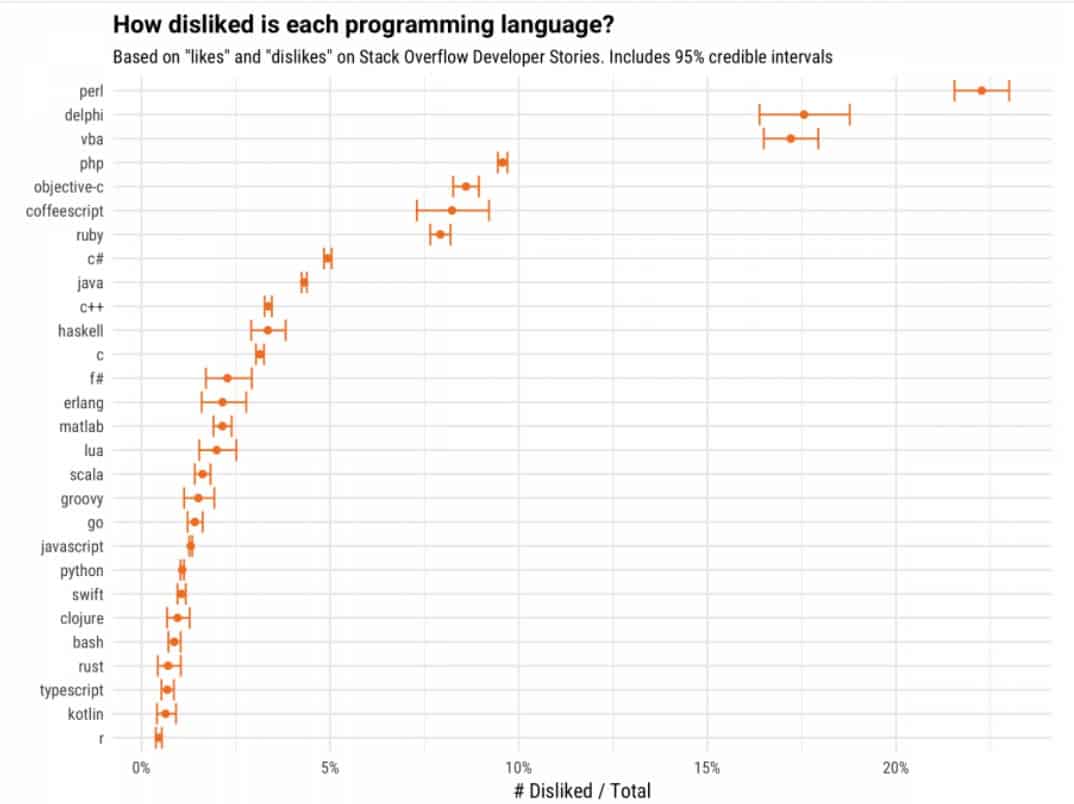Top 5 World’s Most Hated Programming Languages

Recently, StackOverflow released a report stating the most liked and disliked programming languages. We’ve discussed a lot about popular programming languages; let’s talk about the 5 most hated programming languages. Why? What is wrong with them? Today we are going to discuss that only.
Table of contents
Top 5 Most Hated Programming Languages
1. Perl
In the early 97s perl was the most likable language. Then what happened to it in today’s era? Why have people lost interest in it? The first and the most important reason behind its failure is illegible Syntax. It is very complex to use. It includes a lot of special syntaxes and operators which is tough to even understand. If any of the syntax errors arise, it is difficult to sort it out too.
Also, it is pretty hard to read someone else script and to adapt them for your own deeds. Perl Encourages “Hard To Read” Programs. Hard to Read programs are tough to know, tough to understand and thus tough to implement.
Secondly, it uses too many special constructs called Formats. These Formats are difficult to create as well as difficult to return from functions. Another problem with perl is hard to build data structures. Defining interfaces is another problem with it as it lacks signatures.
Last but not the least, the major drawback with it is that it is not really an object-oriented programming language.
Also Read: Top 5 Easiest In-demand Programming Languages in 2018
2. Delphi
Talking about another observed problematic programming language, the first reason for its failure is lack of Multiple Inheritance. Also, there are some legacy issues with it. For example, even if you work with Delphi 3, the legacies are less reliable to use. It confuses you. In earlier days it was using binary data in strings. But now, suddenly they are using Unicode strings that are not reliable at all.
And the worst part of all? Even the compiler does not warn about it. Also, you need to have at least one from {$ENDIF} and {$IFEND} to run the code efficiently.
Also Read: 5 Best Online Programming Courses for Beginners
3. VBA
Most of the professional developers do not seek and do work with visual basics. The main and important reason is the lack of tools and libraries for VBA. The programs written in visual basics cannot be transferred to other operating systems. This is one of the major problems with visual basics.
In VBA, It is not possible to initialize an array of structures at declaration time. There is no much importance of memory management, garbage collection, threading and other important programming features in visual basics. Also, it does not have drag and drop IDE.
Also read: 7 Best Online Compilers to Practice Programming Online
4. Objective-C
The thing that we do not like in Objective-C is it’s restriction to Apple users. It means you have to buy Mac to use it. It is the big reason for its failure. Secondly, the syntax that Objective-C uses is kind of weird. The syntax is not so easy to understand and implement. There is nothing new about Objective-C. It is just like the old plain C.
This programming language uses each and every character in its code that looks ugly. While other languages like Ruby are not like that. It does not use namespace! Surprised? You can use it by adding a number of prefixes but do not use apple’s namespace that is “NS”.
There is only one choice available in the case of Objective-C, one and only Xcode. So you are forced to use only that. Do we need to elaborate more?
Also Read: Top 5 World’s Most Difficult Programming Languages
5. PHP
Most of the people think that it is one of the easiest languages to learn. But we say, they might be ignoring its other side. PHP lacks built-in functions. It also lacks multi-argument forms of system() and exec(). The pcntl extension is also not enabled by default.
A “Default Value” Operator cannot be used in PHP like any of the other programming languages. Another adverse disadvantage of it is its closures. If you will use a PHP version greater than 5.3, closures aren’t there.
Also, built-in function arguments and the return values are inconsistent.
